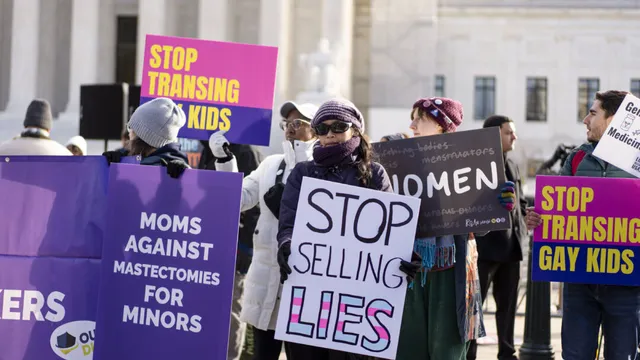
Trans athlete skips championship amid legal battles in Maine
2025-06-11 16:21- A biological male athlete did not compete in the Maine state championships, allowing a female athlete to win.
- Maine Rep. Laurel Libby has been instrumental in the ongoing legislative struggle concerning trans athletes.
- The absence of the trans athlete amidst these debates has sparked conversations about fairness in women's sports.
Express your sentiment!
Insights
In Maine, significant events unfolded during the high school outdoor track and field finals on June 10, 2025, concerning the participation of transgender athletes. This event became a focal point in an ongoing debate related to legislation aimed at protecting women's sports. Maine state Representative Laurel Libby, who has been actively vocal against the participation of trans athletes in girls' sports, gained attention after a trans athlete from Greely High School won a pole vault competition earlier this year. This issue led her to be censured by the local legislative leadership, and subsequently, she fought back legally, eventually taking her case to the Supreme Court to restore her voting rights, which she achieved on May 15, 2025. On the day of the championships, it was reported that a biological male, who won the girls' pole vault in February, did not compete. Libby pointed out the absence of this male athlete, stating that this allowed a female participant to claim the championship rightfully. This change appeared to arrive amidst rising tensions over the presence of trans athletes in women's sports, particularly as a legal challenge was forthcoming from the Department of Justice against Maine's educational policies. They claimed these policies contradicted Title IX, which prohibits discrimination based on sex in federally funded education programs, and has led to several legal confrontations between state authorities and the federal government. Moreover, a survey revealed that a substantial majority of Maine voters favored restricting women's sports to biological women. This echoes a broader sentiment across the U.S. where such issues are stirring debates. Supporters of keeping biological males out of women's sports argue that the physiological differences can create an uneven playing field that disadvantages female athletes. The situation reflects not only the ongoing legal and legislative battles but also the social divisions surrounding issues of gender identity and sports participation. As the controversy over this topic persists, it symbolizes the complexities intertwined with inclusivity versus fairness in competitive sports. Both sides of the debate continue to advocate passionately for their beliefs, reflecting broader societal discussions on gender, athletics, and equality. The outcomes of both ongoing lawsuits and legislative measures will likely shape how states handle gender identity in sports moving forward, impacting future generations of athletes across the country.
Contexts
The implications of Title IX on transgender athletes represent a complex intersection of civil rights, sports policy, and social justice. Title IX, enacted in 1972, is a federal law that prohibits sex-based discrimination in any school or educational program that receives federal funding. As society increasingly recognizes the rights of transgender individuals, the application of Title IX has prompted a significant re-evaluation in the context of athletics. This has led to debates about fairness, inclusion, and the integrity of women’s sports, positioning transgender athletes at the forefront of legal and ethical discourse in sports education. Recent developments have aimed to clarify the participation of transgender athletes in school sports. Various sporting bodies and organizations, including the NCAA, have released policies intended to facilitate the inclusion of transgender athletes while balancing the principles of fair play. These policies vary widely, with some allowing athletes to compete in accordance with their gender identity following a specified period of hormone therapy, while others set more stringent criteria. Critically, proponents argue that inclusion fosters a supportive environment for all students, promoting mental and emotional well-being, while opponents raise concerns about the potential physiological advantages that might arise from male-to-female transitions, pointing to perceived disparities in competitive equity. Legal challenges related to Title IX continue to emerge, leading to landmark court cases and active litigation across the United States. These cases often hinge on interpretations of discrimination and the definition of 'female' within the context of athletics. In several jurisdictions, courts have upheld the rights of transgender athletes to compete consistent with their gender identity, underscoring the evolving understanding of gender as a spectrum rather than a binary classification. Furthermore, these rulings have reinforced the application of Title IX protections, setting precedents that could shape future policies not only in K-12 sports but also in higher education institutions and beyond. As society progresses toward a more comprehensive understanding of gender identity, the ramifications for Title IX and transgender athletes will likely continue to unfold. Policymakers, educators, and sports organizations face the challenge of developing guidelines that not only honor the legal rights of transgender individuals but also address concerns related to competitive integrity. Ultimately, the dialogue surrounding Title IX implications on transgender athletes emphasizes the necessity of fostering inclusivity while striving for fairness in sports, necessitating ongoing research, dialogue, and adjustment to policy frameworks to reflect the realities of the athletes they aim to serve.